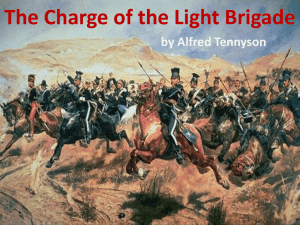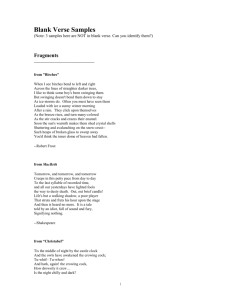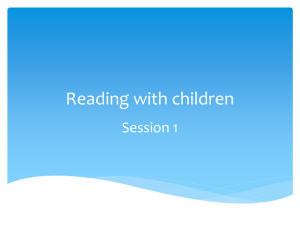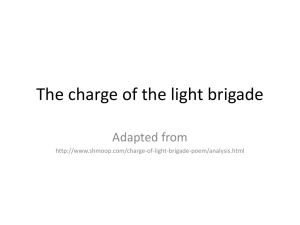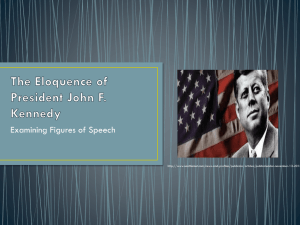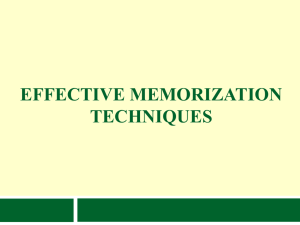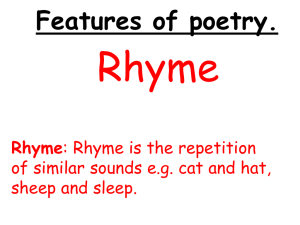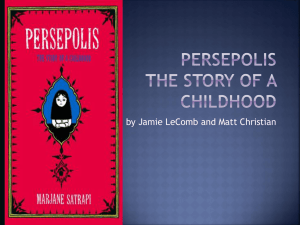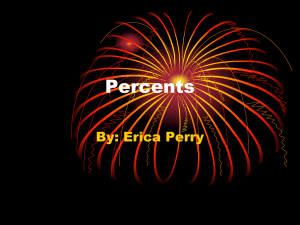Repetition PowerPoint
advertisement
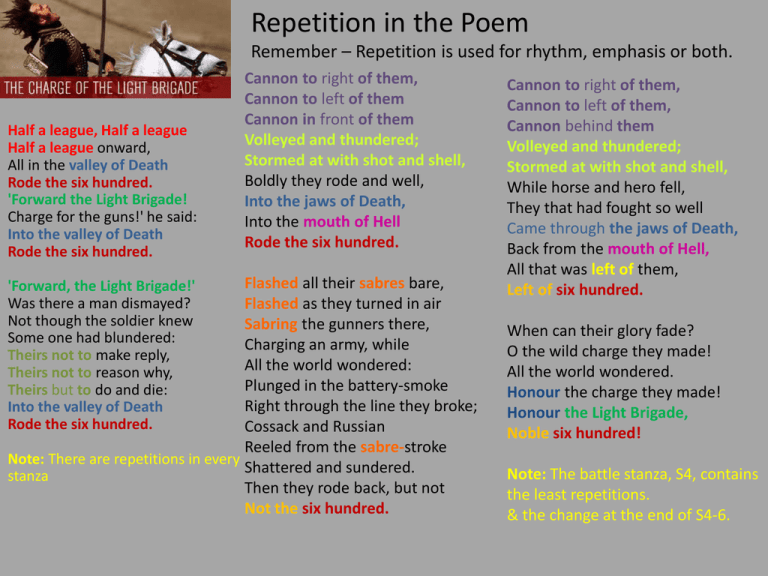
Repetition in the Poem Remember – Repetition is used for rhythm, emphasis or both. Half a league, Half a league Half a league onward, All in the valley of Death Rode the six hundred. 'Forward the Light Brigade! Charge for the guns!' he said: Into the valley of Death Rode the six hundred. Cannon to right of them, Cannon to left of them Cannon in front of them Volleyed and thundered; Stormed at with shot and shell, Boldly they rode and well, Into the jaws of Death, Into the mouth of Hell Rode the six hundred. Flashed all their sabres bare, Flashed as they turned in air Sabring the gunners there, Charging an army, while All the world wondered: Plunged in the battery-smoke Right through the line they broke; Cossack and Russian Reeled from the sabre-stroke Note: There are repetitions in every Shattered and sundered. stanza Then they rode back, but not Not the six hundred. 'Forward, the Light Brigade!' Was there a man dismayed? Not though the soldier knew Some one had blundered: Theirs not to make reply, Theirs not to reason why, Theirs but to do and die: Into the valley of Death Rode the six hundred. Cannon to right of them, Cannon to left of them, Cannon behind them Volleyed and thundered; Stormed at with shot and shell, While horse and hero fell, They that had fought so well Came through the jaws of Death, Back from the mouth of Hell, All that was left of them, Left of six hundred. When can their glory fade? O the wild charge they made! All the world wondered. Honour the charge they made! Honour the Light Brigade, Noble six hundred! Note: The battle stanza, S4, contains the least repetitions. & the change at the end of S4-6. Repetition in the Poem – Stanza 1 & 2 Remember – Repetition is used for rhythm, emphasis or both Half a league, Half a league Half a league onward, All in the valley of Death Rode the six hundred. 'Forward the Light Brigade! Charge for the guns!' he said: Into the valley of Death Rode the six hundred. 'Forward, the Light Brigade!' Was there a man dismayed? Not though the soldier knew Some one had blundered: Theirs not to make reply, Theirs not to reason why, Theirs but to do and die: Into the valley of Death Rode the six hundred. The repetition of ‘Half a league’ is meant to echo the sound of horse hooves beating on the ground as the men charge forward. It also emphasises the distance they had to travel, most of it under fire from enemy guns. A league is the distance a man could walk in an hour, about three miles or five and a half kilometres. ‘Theirs not’ emphasises the way these soldiers did their duty without question, even though they knew that doing their duty and following such orders may well cost them thjeir lives. Repetition in the Poem – Stanza 1 & 2 Remember – Repetition is used for rhythm, emphasis or both. Half a league, Half a league Half a league onward, All in the valley of Death Rode the six hundred. 'Forward the Light Brigade! Charge for the guns!' he said: Into the valley of Death Rode the six hundred. 'Forward, the Light Brigade!' Was there a man dismayed? Not though the soldier knew Some one had blundered: Theirs not to make reply, Theirs not to reason why, Theirs but to do and die: Into the valley of Death Rode the six hundred. The repetition of ‘valley of death emphasises how dangerous the place they are going is and warns us that the story of the poem is not going to have a good outcome for many of the soldiers. The repetition of ‘six hundred’ emphasises the number of soldiers involved in the charges and draws our attention to the change in this line in the final three stanzas of the poem where they are ‘Not’ six hundred any more. The repetition of ‘Forward, the Light Brigade’ emphasises that it the Light Brigade who are engaged in this action as opposed to the Heavy Brigade who were the troops who should have mounted a frontal attack like this....and ‘Forward’ creates a sense of the order to attack being given...and not questioned. Repetition in the Poem – Stanza 3 & 5 Remember – Repetition is used for rhythm, emphasis or both. Cannon to right of them, Cannon to left of them Cannon in front of them Volleyed and thundered; Stormed at with shot and shell, Cannon to right of them, Cannon to left of them, Cannon behind them Volleyed and thundered; Stormed at with shot and shell, The repetition of ‘Cannon’ emphasises the danger the soldiers faced as they were surrounded by enemy gunfire on three sides as they attacked the guns....and then had to face the same assault as they retreated back down the valley to the safety of their own lines. There is also a rhythm established with the repetition of these lines, similar in form to the repetition of ‘Half a league’ at the start of the poem. ‘Volleyed and thundered....stormed at with shot and shell’ emphasises the violent nature of the cannonading the soldiers faced. Shot were solid cannon balls that caused injury as they tore through tissue. Shell were fused, hollow rounds filled with gunpowder that would explode near the enemy killing or injuring by shards of hot metal tearing through tissue. Capt. Nolan was killed by such a shell burst at the start of the charge. Repetition in the Poem – Stanza 3 & 5 : 2 Remember – Repetition is used for rhythm, emphasis or both. Boldly they rode and well, Into the jaws of Death, Into the mouth of Hell Rode the six hundred. They that had fought so well Came through the jaws of Death, Back from the mouth of Hell, All that was left of them, Left of six hundred. The repetition of ‘Jaws of Death...mouth of Hell’ emphasises the deadly danger of the target they were attacking. Those who enter the Jaws of Death and the mouth of Hell tend not to return alive! You also have here the change form ‘Rode the six hundred to the focus on the fact that so few were ‘left’ to return to the safety of their own lines. Repetition in the Poem – Stanza 4 Remember – Repetition is used for rhythm, emphasis or both. This stanza, the battle stanza, has the least amount of repetition and what there is focuses on the principal weapon the soldiers had to use, their sabre. The Heavy Brigade would have had heavy cavalry sabres and rifles to use, but the Light Brigade only had these much lighter weapons. Yet even though the soldiers were so lightly armed the Russians ‘reeled’ from their attack. Flashed all their sabres bare, Flashed as they turned in air Sabring the gunners there, Charging an army, while All the world wondered: Plunged in the battery-smoke Right through the line they broke; Cossack and Russian Reeled from the sabre-stroke Shattered and sundered. Then they rode back, but not Not the six hundred. Repetition in the Poem – Stanza 1 & 2 Remember – Repetition is used for rhythm, emphasis or both. The emphasis in the repetition of the last three lines is on honouring the sacrifice that these soldiers made. They did their duty, obeyed their orders and paid with their lives. The change in the repetition in the last line asks us to focus on the nobility of their action. What they did may seem stupid, but that stupidity lies with the officers who issued the orders, the soldiers were being noble in their effort to do what they had been ordered to do, without moaning and without question: Theirs not to make reply, (question their orders) Theirs not to reason why, (ask reason why such orders) Theirs but to do and die: (do what they are told even if it means their death.) Honour the charge they made! Honour the Light Brigade, Noble six hundred!
